语法概述:名词的特性(属性) 希伯来语
古典文法知识点总结归纳

古典文法知识点总结归纳古典文法是指古代语言的语法规则和用法。
在古代,文法是学习语言的基础,对于认识和理解古代文学作品起着重要的作用。
本文将总结和归纳古典文法的知识点,包括名词、代词、动词、形容词和语法结构等方面的内容,以便读者更好地掌握古典语言的规范和用法。
一、名词名词是指人、物、地点、时间、抽象概念等事物的名称。
在古典文法中,名词的性、数和格是其重要的语法特征。
1. 名词的性名词的性指事物的性别,包括阳性、阴性和中性。
古典文法中,名词的性别通常根据实际的性别来确定,如男性用阳性名词,女性用阴性名词,无性用中性名词。
例如,“人”用阳性名词,“花”用阴性名词,“书”用中性名词。
2. 名词的数名词的数指表示事物的数量,包括单数和复数。
在古典文法中,名词的单复数形式通常是通过词尾的变化来表示的,如在名词后加-s,-es等词尾表示复数。
例如,“人”变成“人们”,“花”变成“花朵”。
3. 名词的格名词的格指名词在句子中所发挥的不同语法作用,包括主格、宾格、属格等。
在古典文法中,名词的格通常是通过词尾的变化来表示的,如在名词后加-s,-es等词尾表示复数。
例如,“人”变成“人们”,“花”变成“花朵”。
二、代词代词是用来代替名词的词语,分为人称代词、物主代词、反身代词、疑问代词等。
在古典文法中,代词的性、数和格也是其重要的语法特征。
1. 人称代词人称代词用来代替人的称呼,包括第一人称、第二人称和第三人称。
在古典文法中,人称代词的形式根据其在句子中的不同作用而有所变化。
例如,“我”、“你”、“他”、“她”、“它”等。
2. 物主代词物主代词用来表示所属关系,包括我的、你的、他的、她的、它的等。
在古典文法中,物主代词的形式通常是由名词的性、数和格来决定的。
例如,“我的书”、“你的花”、“他的家”。
3. 反身代词反身代词用来指代动作的承受者同时也是动作的执行者,包括自己、你自己、他自己等。
在古典文法中,反身代词通常是动词的宾语,并且和主语一致。
语言学概论(7)
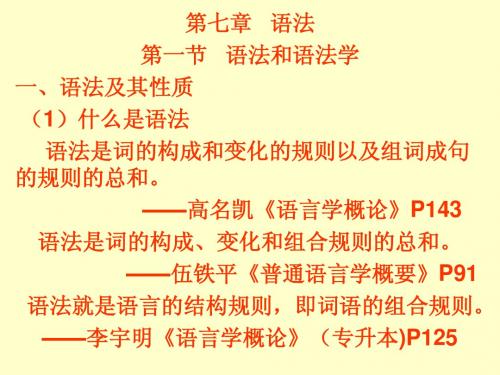
(2)去缀法(disfixation) 去缀法指的是把词缀去掉以构成新词的方法,也 叫逆成法(backformation)。 如: editor→edit sightseeing (n.) →sightsee(v. 游览) legislation(n.立法) →legislate (v.立法) (3)合成法(composition) 合成法指的是把两个以上的词根或词合成一个 词的方法。 聪明 和平 大衣 纠正 司机 地震 blackboard haircut twenty-one he-goat earth-quake daybreak
(6)重音法(accentuation) 重音法指的是用移动重音位置或用重音的不同数 量以构成不同的词的方法。 pre´sent(v.赠送)→ ´present(n.礼物) fre´quent(v.常去)→ ´frequent (adj.时常的) man´kind(人类)→ ´mankind(男人) ´overman(工头)→´over´man(使人员配备过多) ´overwork(n.额外工作)————→´over´work (v.工作过度) 注:汉语采用一种与重音法异曲同工的方法,即轻声 法(lightening)。如: 东西————东西 大头————大头
(9)异根法 通过不同的词来表现语法意义的变化, 因为这些词的词根不同,所以叫“异根 法”。 good---------better---------best bad----------worse-----------worst (10)零形态 不采用任何语法手段来表示语法意义 的语法形式就叫做“零形态”。如英语的 名词的复数等。
词干——一个词除去只包含语法意义的附 加语素所剩下的部分。 The stem is any morpheme or combination of morphemes to which an affix can be added. 词根语素 构词语素 词 词缀语素 词尾语素——构形语素=变词语素
希伯来语 句子

希伯来语句子【实用版】目录1.希伯来语的概述2.希伯来语的语法特点3.希伯来语的字母表和书写系统4.希伯来语在现代的应用5.希伯来语的学习资源与建议正文一、希伯来语的概述希伯来语,又称希伯来文,是一种属于亚非语系的闪米特语族的语言。
它最初是古代希伯来人的母语,主要用于书写《圣经》和其他犹太教文献。
希伯来语有着丰富的历史和文化底蕴,对于了解犹太教和西方文化有着重要意义。
二、希伯来语的语法特点希伯来语是一种典型的辅音与元音相结合的语言,其语法结构较为复杂。
希伯来语的名词分为两种性别:阴性和阳性。
同时,希伯来语中的动词形式丰富多样,有四种时态:过去时、现在时、未来时和完成时。
此外,希伯来语还有许多特殊的语法现象,如词尾变化、双重音节等。
三、希伯来语的字母表和书写系统希伯来语采用希伯来字母表,共有 22 个字母,分为辅音字母和元音字母。
书写系统从右向左,与阿拉伯语和印地语类似。
希伯来语的字母表具有独特的形状和发音,对于初学者来说具有一定的挑战性。
四、希伯来语在现代的应用尽管希伯来语在古代已经逐渐被亚拉姆语(即现代希伯来语)所取代,但它仍然在现代犹太人生活中占有重要地位。
现代希伯来语是以色列的官方语言,用于政府文件、教育、媒体等领域。
此外,希伯来语还是犹太教的重要组成部分,用于宗教仪式和经典研究。
五、希伯来语的学习资源与建议对于有兴趣学习希伯来语的人来说,可以从以下几个方面入手:1.学习希伯来语字母表和基本发音规则,熟悉语音和书写系统;2.学习基本的语法规则和常用词汇,积累词汇量;3.阅读希伯来语的宗教文献和现代文学作品,提高阅读能力;4.参加希伯来语课程或寻求 native speaker 的指导,提高口语和听力水平;5.利用网络资源和手机应用,如字典、学习软件等,辅助学习。
总之,希伯来语是一种古老而富有魅力的语言,对于了解犹太文化和西方宗教有着重要意义。
通俗易懂的语法解析
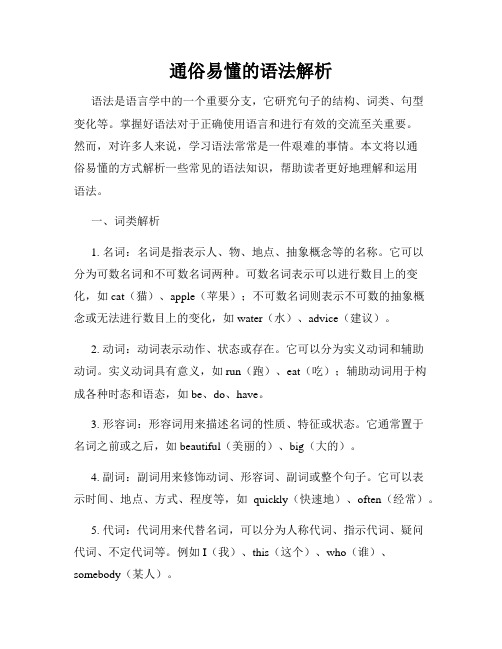
通俗易懂的语法解析语法是语言学中的一个重要分支,它研究句子的结构、词类、句型变化等。
掌握好语法对于正确使用语言和进行有效的交流至关重要。
然而,对许多人来说,学习语法常常是一件艰难的事情。
本文将以通俗易懂的方式解析一些常见的语法知识,帮助读者更好地理解和运用语法。
一、词类解析1. 名词:名词是指表示人、物、地点、抽象概念等的名称。
它可以分为可数名词和不可数名词两种。
可数名词表示可以进行数目上的变化,如cat(猫)、apple(苹果);不可数名词则表示不可数的抽象概念或无法进行数目上的变化,如water(水)、advice(建议)。
2. 动词:动词表示动作、状态或存在。
它可以分为实义动词和辅助动词。
实义动词具有意义,如run(跑)、eat(吃);辅助动词用于构成各种时态和语态,如be、do、have。
3. 形容词:形容词用来描述名词的性质、特征或状态。
它通常置于名词之前或之后,如beautiful(美丽的)、big(大的)。
4. 副词:副词用来修饰动词、形容词、副词或整个句子。
它可以表示时间、地点、方式、程度等,如quickly(快速地)、often(经常)。
5. 代词:代词用来代替名词,可以分为人称代词、指示代词、疑问代词、不定代词等。
例如I(我)、this(这个)、who(谁)、somebody(某人)。
6. 介词:介词用于表示名词与其他词之间的关系,如in(在)、on (在…上面)。
二、句子结构解析1. 主谓结构:主谓结构是最基本的句子结构,由主语和谓语构成。
主语通常是名词或代词,谓语则是一个动词。
例如:“She runs.”(她跑步。
)2. 主谓宾结构:主谓宾结构在主谓结构的基础上加上了宾语,宾语通常是名词或代词,它接受谓语动词的影响。
例如:“He eats an apple.”(他吃一个苹果。
)3. 主谓表结构:主谓表结构在主谓结构的基础上加上了表语,表语用来说明主语的状态、性质或特征。
例如:“She is happy.”(她很开心。
现代汉语语法讲座(二):词类

现代汉语语法讲座(二):词类展开全文(姚老师讲语法)按照词的意义和语法功能,词分实词和虚词。
实词分名词、动词、形容词、数词、量词和代词六类,虚词分副词、介词、连词、助词、叹词和拟声词六类。
一名词表示人或事物名称的词。
(一)名词的分类1.表示人的名称:作家/记者/农夫/青年/娃娃2.表示具体事物:森林/河流/房屋/苹果/山羊3.表示抽象事物:科学/经验/传统/感情/品格4.表示时间:白天/立秋/昨天/春节/明年5.表示处所:中国/江南/河北/南京/地坛6.表示方位:上/下/左/右/东/西/南/北/里头/外边/上面/中间(二)名词的语法特点1.名词一般能同数量词组合,如“一片森林”“五架飞机”。
2.名词一般不能同副词组合,如不能说“不钢笔”“很桌子”。
3.名词一般不能重叠。
“妈妈”“奶奶”不是词的重叠,是重叠式合成词。
4.方位名词常用在其他名词后面,组成名词短语,如“屋檐下”“春节前后”。
5.名词的语法功能主要是作主语、宾语,如“沙漠变绿洲”;作定语,如“鸟儿的叫声”。
表示时间、处所的名词,可以作状语,如“他早晨出门了”“我们楼下谈”。
二动词表示动作行为、发展变化、心理活动等的词。
(一)动词的分类 1.表示动作行为:笑/跳/唱/爱护/守卫2.表示存现、消失或发展、变化:有/出现/丢失/增加/灭亡3.表示心理活动:爱/恨/想念/喜欢/担心4.表示使令意义:使/让/叫/要求5.表示可能意愿(能愿动词):能够/愿意/可以/应该/要/会/敢/肯6.表示趋向(趋向动词):上/下/来/去/起来/回去/上来/过去7.表示判断(判断动词):是(二)动词的语法特点1.动词能同副词组合,如“不看”“都来”;但一般不受程度副词的修饰。
2.动词大多能直接带宾语(及物动词),如“看电视”“去北京”。
3.有些动词可以重叠。
(1)AA 式,如“走走”“听听”;(2)ABAB式,如“学习学习”“考虑考虑”;(3)AABB式,如“来来去去”“说说笑笑”。
法语名词的知识点总结

法语名词的知识点总结名词是法语语法中非常重要的一部分,它是指代人、事物、概念等物体的词类。
在法语中,名词的数、性及前置冠词等属性会对名词进行不同的变化,因此了解名词的知识点对于学习法语来说非常重要。
本文将对法语名词的性、数以及前置冠词等知识点进行总结,希望能够帮助学习者更好地掌握法语名词的相关知识。
一、名词的性在法语中,名词的性分为阳性和阴性两种。
在大多数情况下,名词的性别是固定的,但也有一些名词在阳性和阴性之间没有明显的规律可循。
一般来说,阳性名词往往以辅音结尾,而阴性名词则多以元音结尾。
但这只是一个大致的规律,也有一些名词的性别并不符合这一规律。
因此,学习者在学习名词的性别时需要根据具体的名词进行记忆和理解。
1. 阳性名词阳性名词一般以辅音结尾,例如le livre(书)、le stylo(钢笔)、le banc(长凳)等。
此外,以元音结尾的名词中也有一些是阳性的,如le musée(博物馆)、le problème(问题)等。
在对阳性名词进行单数和复数变化时,一般在词尾加上-s即可,如un livre(一本书)、des livres(一些书)。
2. 阴性名词阴性名词一般以元音结尾,例如la table(桌子)、la chaise(椅子)、la porte(门)等。
也有一些以辅音结尾的名词是阴性的,如la couleur(颜色)、la peur(恐惧)等。
在对阴性名词进行单数和复数变化时,一般在词尾加上-e即可,如une table(一张桌子)、des tables(一些桌子)。
3. 名词性别的变化有些名词在阳性和阴性之间没有明显的规律可循,例如le professeur(教师)可以是男性也可以是女性,而la personne(人)则常用于表示不确定性别的情况。
这些名词的性别需要学习者通过实际运用来记忆和掌握。
二、名词的数在法语中,名词的数分为单数和复数两种。
一般情况下,名词的单数形式是其原形,而复数则在名词后加上适当的变化词尾。
英语语法中的词性简介
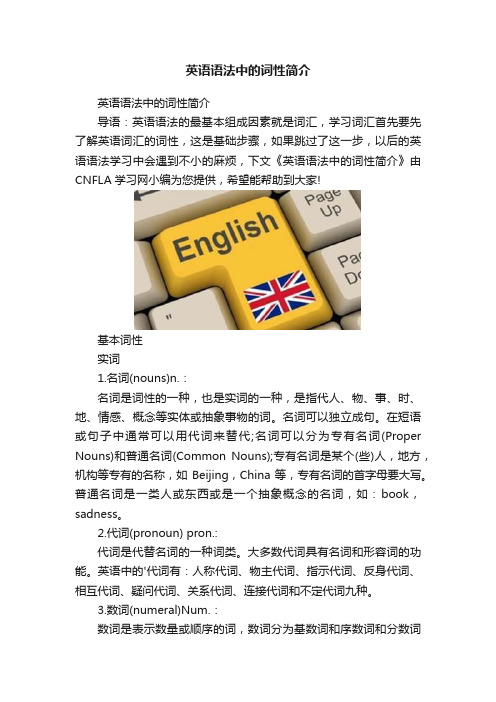
英语语法中的词性简介英语语法中的词性简介导语:英语语法的最基本组成因素就是词汇,学习词汇首先要先了解英语词汇的词性,这是基础步骤,如果跳过了这一步,以后的英语语法学习中会遇到不小的麻烦,下文《英语语法中的词性简介》由CNFLA学习网小编为您提供,希望能帮助到大家!基本词性实词1.名词(nouns)n.:名词是词性的一种,也是实词的一种,是指代人、物、事、时、地、情感、概念等实体或抽象事物的词。
名词可以独立成句。
在短语或句子中通常可以用代词来替代;名词可以分为专有名词(Proper Nouns)和普通名词(Common Nouns);专有名词是某个(些)人,地方,机构等专有的名称,如Beijing,China等,专有名词的首字母要大写。
普通名词是一类人或东西或是一个抽象概念的名词,如:book,sadness。
2.代词(pronoun) pron.:代词是代替名词的一种词类。
大多数代词具有名词和形容词的功能。
英语中的'代词有:人称代词、物主代词、指示代词、反身代词、相互代词、疑问代词、关系代词、连接代词和不定代词九种。
3.数词(numeral)Num.:数词是表示数量或顺序的词,数词分为基数词和序数词和分数词三种。
基数词就是表示数量多少的词,序数词就是表示第几的词。
4.形容词(adjective)adj/a.:形容词是很多语言中均有的主要词类中的一种。
形容词用来修饰名词或代词,表示人或事物的性质,状态,和特征。
5.副词(adverb) adv.:副词是一种用来修饰动词、形容词,说明时间、地点、程度、方式等概念的词。
副词是一种半虚半实的词。
副词可分为:时间副词、地点副词、方式副词、程度副词、疑问副词、连接副词、关系副词、频率副词和说明性副词。
6.动词(Verb)v.:动词是用来表示各类动作的词汇。
基本上每个完整的句子都有一个动词,要表示第二个动作时可使用不定词、动名词、对等连接词、不及物动词、及物动词从属连接词或增加句子等方法。
名词的语法特征
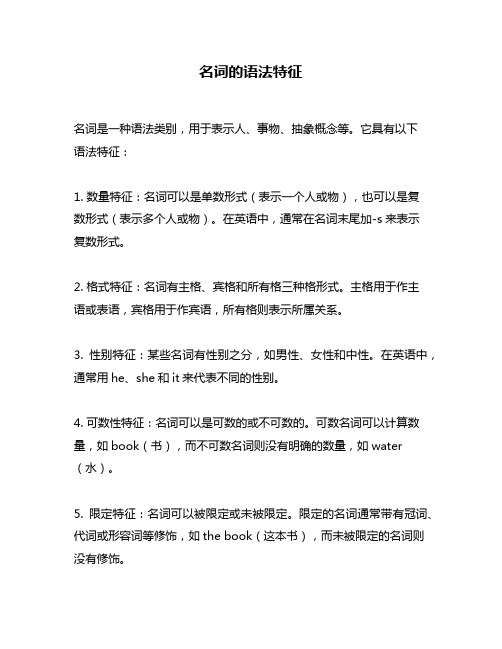
名词的语法特征
名词是一种语法类别,用于表示人、事物、抽象概念等。
它具有以下
语法特征:
1. 数量特征:名词可以是单数形式(表示一个人或物),也可以是复
数形式(表示多个人或物)。
在英语中,通常在名词末尾加-s来表示
复数形式。
2. 格式特征:名词有主格、宾格和所有格三种格形式。
主格用于作主
语或表语,宾格用于作宾语,所有格则表示所属关系。
3. 性别特征:某些名词有性别之分,如男性、女性和中性。
在英语中,通常用he、she和it来代表不同的性别。
4. 可数性特征:名词可以是可数的或不可数的。
可数名词可以计算数量,如book(书),而不可数名词则没有明确的数量,如water (水)。
5. 限定特征:名词可以被限定或未被限定。
限定的名词通常带有冠词、代词或形容词等修饰,如the book(这本书),而未被限定的名词则没有修饰。
6. 外延特征:同一类别的不同名称可以指代相同或不同的事物。
例如,dog(狗)和puppy(小狗)都属于动物类别,但它们指代的具体事
物不同。
总之,名词是语言中最基本的词类之一,具有丰富的语法特征,对于
正确理解和使用语言至关重要。
《希伯来语简介》word版

希伯来语“sabra”意为“土生土长的以色列人”,是犹太人的民族语言,是世界上最古老的语言之一。
它属于中东闪含语系闪语族的一个分支,没有元音字母,只有22个辅音字母,其文字从右往左书写。
许多文学作品和文献是用这种语言创造出来的,今日则主要保留在《圣经》、死海古卷和大量犹太教法典及文献之中。
希伯来语(Hebrew):这是迦南地的通用语言。
据《创世记》10: 15-18,“迦南生长子西顿,又生赫和耶布斯人、亚摩利人、革加撒人、希未人、亚基人……”这些居住在迦南地人的语言就是以后踏足在巴勒斯坦地的以色列民先祖如亚伯拉罕、以撒、雅各所学习和使用的语言。
我们称为希伯来文,所以在创四十:15 ,约瑟说:“我实在是从希伯来人之地被拐来的。
”虽然那时以色列民还没有进入迦南地。
我们可以说,亚伯拉罕从米索波大米亚迁移至迦南时,迦南居民的语言对他们绝对不会很陌生,经过不断的适应、改进、发展,迦南地的语言就被称为希伯来文。
希伯来语属于亚非语系闪米特语族(或属闪含语系闪语族),为犹太教的宗教语言。
过去的二千五百年,“希伯来语”主要用于《圣经》与相关宗教方面的研究,自从20世纪特别是以色列复国以来,“希伯来语”作为口语在犹太人中重新复活,渐渐取代阿拉伯语、犹太西班牙语和意第绪语(或称为“依地语”,犹太人使用的国际交流语),以色列建国后将“希伯来语”定为官方语言之一,目前(2004年)使用人口约510万,另一种官方语言是阿拉伯语。
闪语是古时米索波大米亚(Mesopotamia)、叙利亚、巴勒斯坦和阿拉伯这片广大地区民族的日常用语。
按地区,我们可以将闪语分成三支:A. 东闪语(East Semitic)B. 西北闪语(Northwest Semitic)C. 西南闪语(Southwest Semitic)其中西北闪语(Northwest Semitic):分为两支:1. 亚兰语(Aramaic)2. 迦南闪语(Canaanite)(a) 摩押(Moabic)(b) 腓利基(Phoenician)(c) 希伯来文(Hebrew)(d) 乌加列文(Ugaritic)犹太人原来是居住在阿拉伯半岛的一个游牧民族,最初被称为希伯来人,意思是“游牧的人”。
性、数、格、体,常见的语法范畴汇总

性、数、格、体,常见的语法范畴汇总语法范畴是对语法意义的抽象概括,也就是说,把特定语言中具有共同特点的语法意义概括起来就形成一个个语法范畴。
常见的语法范畴有性、数、格、人称、时、体、态等。
常见的语法范畴1.性(gender)“性”的语法范畴是属于名词类的词所具有的,印欧语系的语言大多有这种语法范畴。
不过性的数量不等,如法语有阳性和阴性,俄语和德语有阳性、阴性和中性。
俄语以辅音结尾的为阳性,以a结尾的为阴性,以o结尾的为中性。
要注意的是,作为语法范畴的“性”不同于自然性别(sex)。
2.数(number)“数”的语法范畴一般也为名词类的词所有,表示现实中的事物的数量关系,一般包括单数和复数两种意义,有的语言还有双数、三数、四数之分,如阿拉伯语除了单复数外有双数。
通常只有表示具体的可以计数的事物的名词才有数的语法范畴,像专有名词、抽象名词等就没有数的变化。
3.格(case)“格”属于名词和代词的语法范畴,表示这类词在句子中的作用和与其它词的语法关系。
格的数量在不同的语言中也是不一样的,德语有主格、与格、所有格、宾格,俄语有主格、所有格、与格、宾格、工具格、前置格。
英语的代词有主格(nominative case)、宾格(objective case)、所有格(possessive case)之分,一般名词只有通格和所有格,因为主格和宾格没有形式上的变化,主要是通过在句子中的作用和位置来确定的所有格是在词后面加¢s表示。
4.体(aspect)“体”是动词特有的语法范畴,表示动作行为进行的情况、方式,可以表示动作的开始、持续、结束、完成等多种意义。
英语有普通体、进行体、完成体。
汉语的体的分类有不同的说法,如认为“了”表示完成体,“过”表示经历体,“着”表示进行体,重叠表示尝试体,如看看、摸摸、拍拍、捏捏等。
5.时(tense)“体”属于动词的语法范畴,表示动作行为发生和进行的时间,确定时间的标准是说话(写)的时刻。
希伯来语语法结构与汉语有何异同

希伯来语语法结构与汉语有何异同语言是人类交流和思维的重要工具,不同的语言在语法结构上往往存在着显著的差异。
希伯来语和汉语作为两种具有独特特点的语言,其语法结构也有诸多不同之处。
首先,从词序方面来看,汉语是一种主谓宾(SVO)结构较为固定的语言,通常句子的基本语序是主语在前,谓语在中,宾语在后。
例如“我吃饭”,“我”是主语,“吃”是谓语,“饭”是宾语。
而希伯来语的词序相对灵活,虽然也常见 SVO 结构,但根据强调重点和表达需要,也תאםיהולאה”(祝福你们神),可以是 SOV 或者 VSO 等结构。
比如“וכרב词序就是 VSO。
在词性方面,汉语的词性分类较为明确,名词、动词、形容词、副词等有比较清晰的界定和用法。
而希伯来语的词性变化相对复杂。
例如,希伯来语的名词有性、数、格的变化。
名词分阳性、阴性和中性,并且根据单复数和在句子中的语法地位会有不同的形式。
相比之下,汉语的名词一般没有性和格的变化,复数形式通常通过添加量词来表示,如“一本书”“两匹马”。
动词方面,汉语的动词时态主要通过词汇手段,如“正在”“已经”“将要”等来表达。
希伯来语的动词则有丰富的时态和体的变化形式。
它不仅有现在时、过去时、将来时,还有完成体和未完成体等。
这种动词形式的变化在很大程度上决定了句子的时间和状态。
关于形容词,汉语中的形容词通常在名词前修饰名词,如“红色的花”。
在希伯来语中,形容词的位置相对灵活,既可以在名词前,也可以在名词后,并且需要与名词在性、数、格上保持一致。
在句子的构成上,汉语重视意合,句子的逻辑关系常常通过词语之间的内在意义和语境来体现。
比如“天下雨,我不出门”,通过简单的排列就能表达出因果关系。
而希伯来语更注重形合,较多地依靠连接ינא,אלאצויםשגהרוי词和语法形式来明确句子之间的关系。
例如“יכדתיבהמ"(因为下雨,我不出去家),使用了“יכ”(因为)这个连接词来明确因果关系。
名词的语法特点
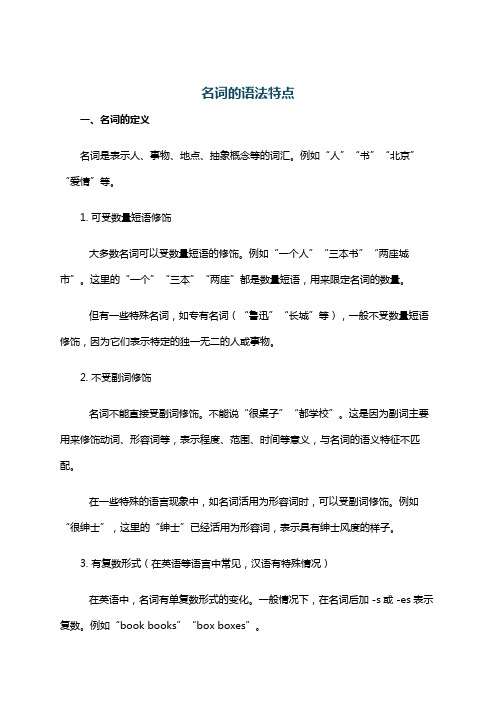
名词的语法特点一、名词的定义名词是表示人、事物、地点、抽象概念等的词汇。
例如“人”“书”“北京”“爱情”等。
1. 可受数量短语修饰大多数名词可以受数量短语的修饰。
例如“一个人”“三本书”“两座城市”。
这里的“一个”“三本”“两座”都是数量短语,用来限定名词的数量。
但有一些特殊名词,如专有名词(“鲁迅”“长城”等),一般不受数量短语修饰,因为它们表示特定的独一无二的人或事物。
2. 不受副词修饰名词不能直接受副词修饰。
不能说“很桌子”“都学校”。
这是因为副词主要用来修饰动词、形容词等,表示程度、范围、时间等意义,与名词的语义特征不匹配。
在一些特殊的语言现象中,如名词活用为形容词时,可以受副词修饰。
例如“很绅士”,这里的“绅士”已经活用为形容词,表示具有绅士风度的样子。
3. 有复数形式(在英语等语言中常见,汉语有特殊情况)在英语中,名词有单复数形式的变化。
一般情况下,在名词后加 -s或 -es表示复数。
例如“book books”“box boxes”。
在汉语中,部分名词可以通过在后面加“们”表示复数,但这种用法有一定的限制。
例如“同学们”“工人们”。
但并不是所有名词都能加“们”,像“桌子们”这种用法就不符合汉语习惯。
而且有些名词本身就表示复数概念,如“人民”“群众”等。
4. 在句中常充当主语、宾语、定语等成分作主语:在句子中,名词经常充当主语,表示动作的执行者或描述的对象。
例如“太阳升起来了。
”这里的“太阳”是主语,是“升起来”这个动作的执行者。
作宾语:名词也常作宾语,是动作的承受者。
例如“我看书。
”“书”就是“看”这个动作的承受者,作宾语。
作定语:有些名词可以作定语修饰其他名词。
例如“学校图书馆”,这里的“学校”作定语,修饰“图书馆”,表明图书馆的所属关系。
5. 能与介词组成介词短语名词可以和介词组成介词短语,在句中作状语、补语等。
例如“在教室里学习”,“教室里”是由介词“在”和名词“教室”组成的介词短语,在句中作状语,表示学习的地点;“放在桌子上”,“桌子上”是介词短语作补语,补充说明“放”这个动作的结果。
希伯来语教程

希伯来语教程希伯来语是一种使用希伯来字母的语言,它是以色列的官方语言之一。
下面是一个简单的希伯来语教程,旨在帮助初学者入门。
1. 字母表希伯来语有22个字母。
它们分别是:、למ、、כםך、、、ע、ס、נ、、ןג、、、ביא、הדח、ט、、、זו、ר、、、קתשץ、פף、、צ、2. 发音希伯来语的发音与中文有些许不同。
下面是一些常见音标及其对应的希伯来字母:a - אb - בg - גd - דe - הu - וz - זch - חt - טi - יk - כl - לm - מn - נs - סo - עp - פts - צk - קr - רsh - שth - ת3. 基本语法希伯来语的基本语序是主谓宾。
名词通常以定冠词“ה”开头,表示“这个”的意思,例如“בלכה”(这只狗)。
形容词在性、数和格方面与名词一致。
动词有过去时、现在时和将来时三种时态。
4. 常用短语- 你好:םולש(Shalom)- 谢谢:הדות(Toda)- 对不起:רעטצמ(Mit’sta’er)ךתוא(An i ohev ot’cha)בהוא- 我爱你:ינא- 请问:אנא(‘An-na)这只是一个简单的希伯来语教程,希望能帮助你快速入门希伯来语。
如果你对希伯来语感兴趣,可以继续学习更深入的知识,探索更多有关希伯来语的文化和历史。
语法概述:名词的特性(属性) 希伯来语
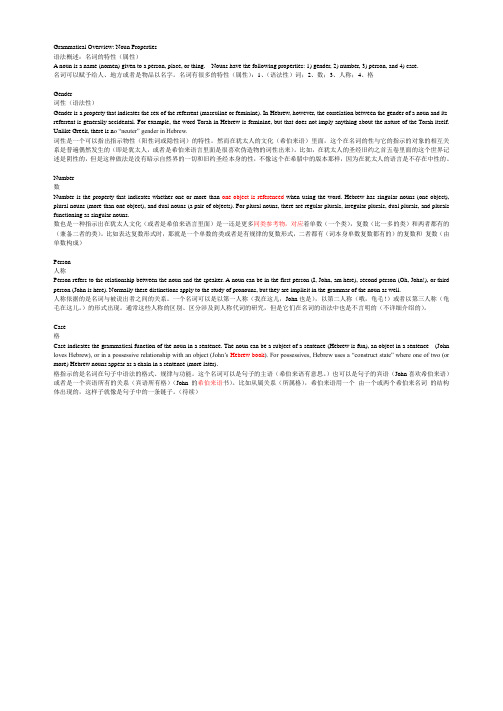
Grammatical Overview: Noun Properties语法概述:名词的特性(属性)A noun is a name (nomen) given to a person, place, or thing. Nouns have the following properties: 1) gender, 2) number, 3) person, and 4) case.名词可以赋予给人、地方或者是物品以名字。
名词有很多的特性(属性):1、(语法性)词;2、数;3、人称;4、格Gender词性(语法性)Gender is a property that indicates the sex of the referrent (masculine or feminine). In Hebrew, however, the correlation between the gender of a noun and its referrent is generally accidental. For example, the word Torah in Hebrew is feminine, but that does not imply anything about the nature of the Torah itself. Unlike Greek, there is n o “neuter” gender in Hebrew.词性是一个可以指出指示物性(阳性词或隐性词)的特性。
然而在犹太人的文化(希伯来语)里面,这个在名词的性与它的指示的对象的相互关系是普遍偶然发生的(即是犹太人,或者是希伯来语言里面是很喜欢伪造物的词性出来)。
比如,在犹太人的圣经旧约之首五卷里面的这个世界记述是阴性的,但是这种做法是没有暗示自然界的一切和旧约圣经本身的性,不像这个在希腊中的版本那样,因为在犹太人的语言是不存在中性的。
希伯来文法专有名词中英对照表1-Hebrew
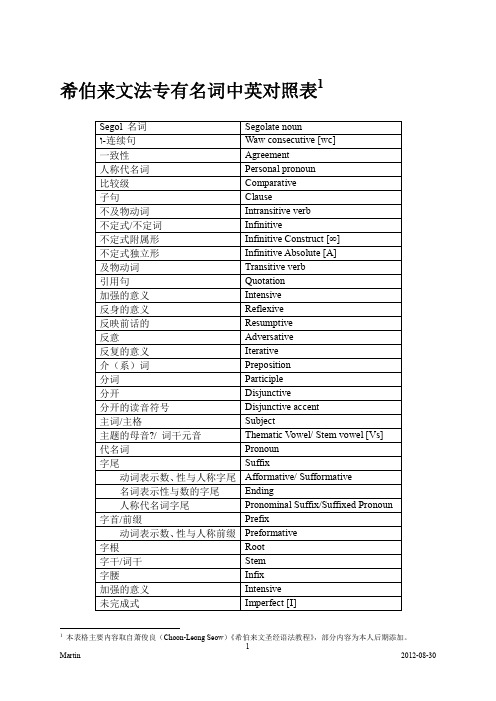
希伯来文法专有名词中英对照表1Segol 名词Segolate nounו-连续句Waw consecutive [wc]一致性Agreement人称代名词Personal pronoun比较级Comparative子句Clause不及物动词Intransitive verb不定式/不定词Infinitive不定式附属形Infinitive Construct [∞]不定式独立形Infinitive Absolute [A]及物动词Transitive verb引用句Quotation加强的意义Intensive反身的意义Reflexive反映前话的Resumptive反意Adversative反复的意义Iterative介(系)词Preposition分词Participle分开Disjunctive分开的读音符号Disjunctive accent主词/主格Subject主题的母音?/ 词干元音Thematic V owel/ Stem vowel [Vs]代名词Pronoun字尾Suffix动词表示数、性与人称字尾Afformative/ Sufformative名词表示性与数的字尾Ending人称代名词字尾Pronominal Suffix/Suffixed Pronoun 字首/前缀Prefix动词表示数、性与人称前缀Preformative字根Root字干/词干Stem字腰Infix加强的意义Intensive未完成式Imperfect [I]1本表格主要内容取自萧俊良(Choon-Leong Seow)《希伯来文圣经语法教程》,部分内容为本人后期添加。
永续Kethiv-Qere? Perpetual Kethiv-Qere (ירק־ביתכּ) 古语、古体形式Archaic form平行体Parallelism出自名词或形容词的动词Denominative母音字母Mater lectionis (Pl: Matres…)母音退化V owel reduction目的句Purpose clause名词Noun名词子句Nominal clause多音节的Polysyllabic有声Shewa V ocal Shewa有声子音V oiced consonant同化Assimilation同位格、同位词Apposition同根字Cognate估计的意义Estimative作为的意义Factitive序数Ordinal number否定词Negation, particle of完成式Perfect [P]形式Form形容个别的语词Distributive形容词Adjective直接受词(宾语)Direct Object使役的意义Causative依附介(系)词Prefixed preposition呼格V ocative性别、性Gender状态动词Stative V erb受词(宾语)Object受词(宾语)字尾Object Suffix附属形Construct State附属组合词Construct Chain长写法Full spelling / Plene spelling非特定Indefinite冠词Definite Article后接的Proclitic型态?/(词,尤指词尾的)变化Inflection指示词Demonstratives指示代名词Demonstrative Pronoun指示形容词Demonstrative Adjective指向后缀◌ה)הDirectional Ending (◌相互Reciprocity相互的意义Reciprocal相关词Cognate祈使式Imperative[M]祈愿式Jussive [J]省略Constraction重音Stress重音前的第一音节Pretonic syllable重音前的第二音节Propretonic syllable宣告的意义Declarative重复/复制Doubling音位互换Metathesis音节Syllable述语Predicative限定性动词Finite verb倒数第二音节Penultima容受的意义Tolerative唇音Labial根音Radical根类Root type弱Dagesh Dagesh Lene/ weak Dagesh弱根Weak radical特定Definite特定直接受词(宾语)记号Definite direct object marker (DDO) 消失Apocope被动Passive时态Tense退化(母音退化)Reduction马所拉经文Massoretic Text (MT)停顿形Pausal form副词Adverb副词子句Adverbial clause动词V erb动词子句V erbal clause动词的字形变化/式态Conjugation基数Cardinal number专用名词、人名、地名Proper noun带重音的音节Tonic syllable条件子句Protasis条件句Conditional sentence连接的Dagesh Conjunctive Dagesh连接的读音符号Conjunctive accent连接词Conjunction连接的Hireq Compaginis Hireq(造)句法Syntax强Dagesh Dagesh Forte/ Strong Dagesh 强调Emphasis强调的Emphatic习惯/惯例Habit/ Custom部分的Partitive阴性Feminine喉音Guttural [G]喉音前Patach Furtive Patach拼音/转写Transliteration最后音节Ultima最高级Superlative补偿延长Compensatory lengthening 短写法Defective spelling无动词子句V erbless clause无连接词Asyndetic无声Shewa Silent Shewa无声子音Unvoiced consonant普通名词Common noun结句Apodosis结果的意义Resultative虚拟重复Virtual doubling间接受词(宾语)Indirect object阳性Masculine塞音Stop单音节的Monosyllabic单数Singular [s]感叹词Interjection禁令Prohibition过去式Preterite鼓励式Cohortative [C]诗歌体Poetry集合名词Collective noun誓语Oath语助词(质词)、小品词Particle疑问词Interrogative clause疑问代名词(问物的/问人的)Interrogative Pronoun(impersonal/personal)疑问副词(问方式的/问地方的)Interrogative Adverb (of manner/ ofplace疑问词Interrogative particle嘶音Sibilant写法Spelling数Number数字Numeral复合Shewa Composite Shewa复数Plural (p2)质词Particle齿音Dental拥有Possession选择Alternative独立形Absolute state默音אQuiescent א擦音Spirant关身的意义Middle关系子句Relative clause关系词Relative particle双II Geminate双元音Diphthong双数Dual辞典/词典Dictionary/ Lexicon类型Pattern属性形容词Attributive adjective读音符号/重音符号Accent鉴别注释Critical Apparatus变化(动词有性、数与人称的)Inflection变化表Paradigm惊叹Exclamation让步的用法Concessive动体/观点? Aspect语法分析/词类分析Parsing字尾形Final form轻元音/退化元音Reduced vowel2复数(Plural)的简写与完成式(Perfect)一样,但是在语法分析(parsing)的时候代码所在的位置不同,不会混淆的。
名词的语法知识点总结
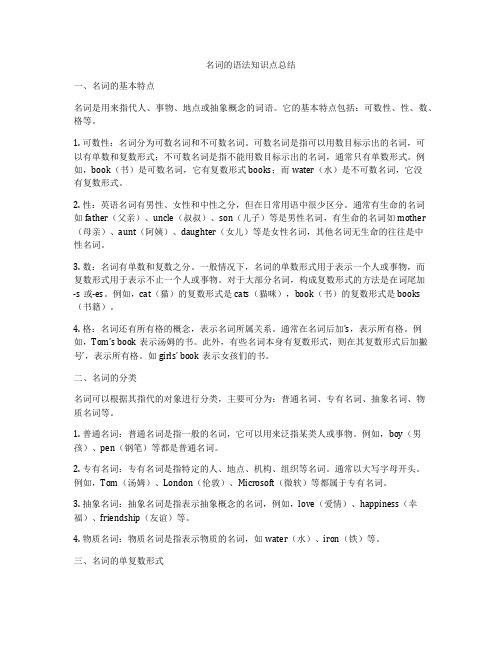
名词的语法知识点总结一、名词的基本特点名词是用来指代人、事物、地点或抽象概念的词语。
它的基本特点包括:可数性、性、数、格等。
1. 可数性:名词分为可数名词和不可数名词。
可数名词是指可以用数目标示出的名词,可以有单数和复数形式;不可数名词是指不能用数目标示出的名词,通常只有单数形式。
例如,book(书)是可数名词,它有复数形式books;而water(水)是不可数名词,它没有复数形式。
2. 性:英语名词有男性、女性和中性之分,但在日常用语中很少区分。
通常有生命的名词如father(父亲)、uncle(叔叔)、son(儿子)等是男性名词,有生命的名词如mother (母亲)、aunt(阿姨)、daughter(女儿)等是女性名词,其他名词无生命的往往是中性名词。
3. 数:名词有单数和复数之分。
一般情况下,名词的单数形式用于表示一个人或事物,而复数形式用于表示不止一个人或事物。
对于大部分名词,构成复数形式的方法是在词尾加-s或-es。
例如,cat(猫)的复数形式是cats(猫咪),book(书)的复数形式是books (书籍)。
4. 格:名词还有所有格的概念,表示名词所属关系。
通常在名词后加’s,表示所有格。
例如,Tom’s book表示汤姆的书。
此外,有些名词本身有复数形式,则在其复数形式后加撇号’,表示所有格。
如girls’ book表示女孩们的书。
二、名词的分类名词可以根据其指代的对象进行分类,主要可分为:普通名词、专有名词、抽象名词、物质名词等。
1. 普通名词:普通名词是指一般的名词,它可以用来泛指某类人或事物。
例如,boy(男孩)、pen(钢笔)等都是普通名词。
2. 专有名词:专有名词是指特定的人、地点、机构、组织等名词。
通常以大写字母开头。
例如,Tom(汤姆)、London(伦敦)、Microsoft(微软)等都属于专有名词。
3. 抽象名词:抽象名词是指表示抽象概念的名词,例如,love(爱情)、happiness(幸福)、friendship(友谊)等。
希腊语中的名词性和动词性的形容词

希腊语中的名词性和动词性的形容词希腊语作为一种古老而丰富的语言,具有独特的语法结构和词汇特点。
在希腊语中,形容词被分为名词性形容词和动词性形容词两种类型,它们在句子中的作用和词形变化上有所差异。
本文将介绍希腊语中的名词性和动词性形容词的特点和用法。
一、名词性形容词名词性形容词在希腊语中用于修饰名词,并且可以在句子中作为名词使用。
它们可以在性、数和格上进行变化,以适应名词的不同形式。
1. 变形方式名词性形容词的变形方式根据名词的性、数和格来确定。
具体变形方式如下:(1)性:希腊语中的名词性形容词有三种性别,即阳性、阴性和中性。
形容词的性与被修饰的名词性别一致。
(2)数:形容词的数与名词一致。
单数形容词修饰单数名词,复数形容词修饰复数名词。
(3)格:形容词的变格形式与名词的格形式相对应。
常见的格包括主格、宾格和属格等。
2. 用法示例名词性形容词在句子中充当名词的角色,可以作为主语、宾语或定语出现。
下面是一些用法示例:(1)主语:白色的花朵非常美丽。
翻译:“Οι λευκές ανθοι είναι πολύ όμορφα。
”(2)宾语:我喜欢高大的建筑物。
翻译:“Μου αρέσουν τα ψηλά κτήρια。
”(3)定语:她戴着红色的帽子。
翻译:“Φοράει ένα κόκκινοκαπέλο。
”二、动词性形容词动词性形容词在希腊语中用来表示动作或状态,并且需要和助动词连用。
它们在时态、人称和数上进行变化,以适应不同的句子结构。
1. 变形方式动词性形容词的变形方式根据时态、人称和数来确定。
具体变形方式如下:(1)时态:希腊语中的动词性形容词有多种时态,包括现在时、过去时和将来时等。
形容词的时态随句子的时态而变化。
(2)人称和数:形容词的人称和数与主语的人称和数一致。
单数形容词修饰单数主语,复数形容词修饰复数主语。
2. 用法示例动词性形容词需要和助动词连用,可以用来表示动作或状态。
下面是一些用法示例:(1)现在进行时:他正在读一本有趣的书。
简述名词的语法特点

简述名词的语法特点摘要:一、名词的定义和作用二、名词的语法特点1.可数性与不可数性2.单复数形式3.所有格与属格4.与介词的搭配5.名词的词性转换三、实例分析与应用正文:在我们日常生活中,名词无处不在,它们用来表示人、事物、地点或概念。
作为一种重要的词类,名词在构建句子和表达意义方面发挥着至关重要的作用。
本文将简要介绍名词的语法特点,以帮助大家更好地理解和使用名词。
首先,我们来了解一下名词的定义和作用。
名词是表示人、事物、地点或概念的词,它可以作为主语、宾语、表语等成分出现在句子中。
例如:“她是一位老师。
”(她:名词,作为主语)、“我喜欢读书。
”(书:名词,作为宾语)接下来,我们探讨一下名词的语法特点。
1.可数性与不可数性:名词可分为可数名词和不可数名词。
可数名词表示个体,如“一个人”、“一本书”;不可数名词表示物质或抽象概念,如“水”、“幸福”。
2.单复数形式:大部分名词有单数和复数两种形式,如“猫”和“猫们”。
需要注意的是,不可数名词没有复数形式,如“水”不能说成“水们”。
3.所有格与属格:所有格表示名词与其所修饰的名词之间的所有关系,如“我的书”;属格表示名词与其所修饰的名词之间的所属关系,如“书的封面”。
4.与介词的搭配:名词可以与介词搭配构成介词短语,如“在桌子上”、“从窗户里”。
介词短语可以作为句子的一部分,如“我把书放在桌子上。
”5.名词的词性转换:在某些语境下,名词可以转换为其他词类,如“教师”转换为动词“教书”、“学校”转换为形容词“学校的”。
最后,我们通过实例来分析与应用这些语法特点。
例如:“一杯咖啡”(可数名词、不可数名词的用法)、“他们的房子”(所有格、属格的用法)、“在图书馆里”(介词搭配)、“一个优秀的教师”(名词转换为形容词)总之,掌握名词的语法特点有助于我们更准确地表达思想和更好地理解他人所表达的意义。
希伯来语语法
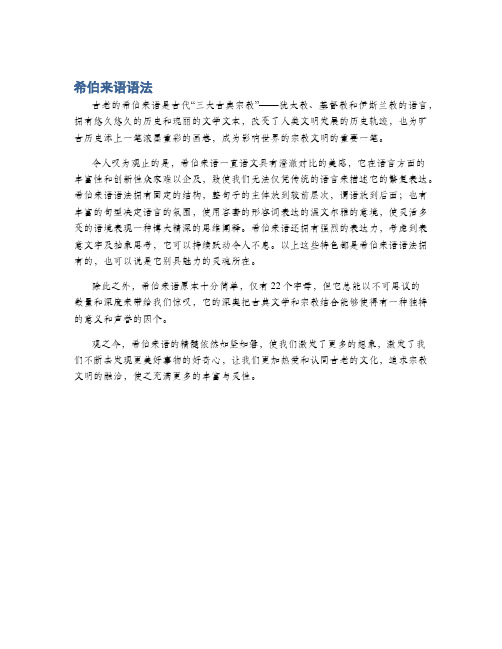
希伯来语语法
古老的希伯来语是古代“三大古典宗教”——犹太教、基督教和伊斯兰教的语言,拥有悠久悠久的历史和瑰丽的文学文本,改变了人类文明发展的历史轨迹,也为旷古历史添上一笔浓墨重彩的画卷,成为影响世界的宗教文明的重要一笔。
令人叹为观止的是,希伯来语一直语文具有澄澈对比的美感,它在语言方面的丰富性和创新性众家难以企及,致使我们无法仅凭传统的语言来描述它的繁复表达。
希伯来语语法拥有固定的结构,整句子的主体放到较前层次,谓语放到后面;也有丰富的句型决定语言的氛围,使用客套的形容词表达的温文尔雅的意境,使灵活多变的语境表现一种博大精深的思维阐释。
希伯来语还拥有强烈的表达力,考虑到表意文字及抽象思考,它可以持续跃动令人不息。
以上这些特色都是希伯来语语法拥有的,也可以说是它别具魅力的灵魂所在。
除此之外,希伯来语原本十分简单,仅有22个字母,但它总能以不可思议的
数量和深度来带给我们惊叹,它的深奥把古典文学和宗教结合能够使得有一种独特的意义和声誉的因个。
观之今,希伯来语的精髓依然如坚如磐,使我们激发了更多的想象,激发了我们不断去发现更美好事物的好奇心,让我们更加热爱和认同古老的文化,追求宗教文明的融洽,使之充满更多的丰富与灵性。
希伯来的名词解释

希伯来的名词解释希伯来语是古代以色列人使用的语言,也是犹太教的圣经语言,它有着悠久而丰富的历史。
在希伯来语中,名词是其中重要的一部分,它们承载着丰富的文化、历史、宗教和哲学内涵。
在这篇文章中,我们来探讨一些希伯来的名词解释,以便更好地理解和欣赏这门古老语言的独特之处。
1. 餓死民在希伯来语中,有一个非常有意义的名词“餓死民”(evel raav),它出现在诗篇119篇131节。
这个短语与贫穷、饥饿有关,但它更多地带有一种精神层面的寓意。
在犹太教的教义中,人们被教导要关心贫穷的人,与他们共享自己的食物和财富。
因此,这个名词不仅仅是形容实际的饥饿,更是提醒人们要关注弱势群体,给予他们帮助和关爱。
2. 慈悲慈悲(rachamim)在希伯来语中是一个重要的概念,它常常与上帝的品质和人类的宽容相联系。
这个名词源于希伯来语中的一个词根,意味着"被动的宽容"。
慈悲是一种对他人痛苦的关怀和同情,以及能够原谅他们的过错,并给予他们一个新的机会。
在犹太教的经文中,上帝被称为"满有慈悲和宽容",因为他对人性的错误不断宽恕,给予人类新的希望和机遇。
3. 罪罪(chet)这个名词在希伯来语中有着丰富而复杂的含义。
它不仅仅是指一种道德上的过错,更是指一种违背上帝的戒律和人类社会道德的行为。
在犹太教的教义中,罪被看作是一种与上帝和人类社群断裂的状态。
因此,当人们寻求上帝的宽恕和救赎时,他们必须后悔自己的罪过,并努力改正和避免再犯同样的错误。
4. 祝福祝福(bracha)这个名词是希伯来语中一个非常重要的概念,也是犹太教仪式中常用的一个词汇。
它与上帝的赐予和保佑有关,也与人们对他人的祝愿和祝福相联系。
在犹太教的宗教仪式中,祝福是一种通过特定的仪式和祈祷,期望上帝给予人们幸福、健康和成功的方式。
同时,人们也常常向他人表达祝福,希望他们在生活中充满喜乐和幸福。
5. 礼拜礼拜(avodah)是一个涵盖了宗教仪式、敬奉和奉献的名词。
- 1、下载文档前请自行甄别文档内容的完整性,平台不提供额外的编辑、内容补充、找答案等附加服务。
- 2、"仅部分预览"的文档,不可在线预览部分如存在完整性等问题,可反馈申请退款(可完整预览的文档不适用该条件!)。
- 3、如文档侵犯您的权益,请联系客服反馈,我们会尽快为您处理(人工客服工作时间:9:00-18:30)。
Grammatical Overview: Noun Properties
语法概述:名词的特性(属性)
A noun is a name (nomen) given to a person, place, or thing. Nouns have the following properties: 1) gender, 2) number, 3) person, and 4) case.
名词可以赋予给人、地方或者是物品以名字。
名词有很多的特性(属性):1、(语法性)词;2、数;3、人称;4、格
Gender
词性(语法性)
Gender is a property that indicates the sex of the referrent (masculine or feminine). In Hebrew, however, the correlation between the gender of a noun and its referrent is generally accidental. For example, the word Torah in Hebrew is feminine, but that does not imply anything about the nature of the Torah itself. Unlike Greek, there is n o “neuter” gender in Hebrew.
词性是一个可以指出指示物性(阳性词或隐性词)的特性。
然而在犹太人的文化(希伯来语)里面,这个在名词的性与它的指示的对象的相互关系是普遍偶然发生的(即是犹太人,或者是希伯来语言里面是很喜欢伪造物的词性出来)。
比如,在犹太人的圣经旧约之首五卷里面的这个世界记述是阴性的,但是这种做法是没有暗示自然界的一切和旧约圣经本身的性,不像这个在希腊中的版本那样,因为在犹太人的语言是不存在中性的。
Number
数
Number is the property that indicates whether one or more than one object is referenced when using the word. Hebrew has singular nouns (one object), plural nouns (more than one object), and dual nouns (a pair of objects). For plural nouns, there are regular plurals, irregular plurals, dual plurals, and plurals functioning as singular nouns.
数也是一种指示出在犹太人文化(或者是希伯来语言里面)是一还是更多同类参考物,对应着单数(一个类),复数(比一多的类)和两者都有的(兼备二者的类)。
比如表达复数形式时,那就是一个单数的类或者是有规律的复数形式,二者都有(词本身单数复数都有的)的复数和复数(由单数构成)
Person
人称
Person refers to the relationship between the noun and the speaker. A noun can be in the first person (I, John, am here), second person (Oh, John!), or third person (John is here). Normally these distinctions apply to the study of pronouns, but they are implicit in the grammar of the noun as well.
人称依据的是名词与被说出者之间的关系。
一个名词可以是以第一人称(我在这儿,John也是),以第二人称(哦,龟毛!)或者以第三人称(龟毛在这儿。
)的形式出现。
通常这些人称的区别、区分涉及到人称代词的研究,但是它们在名词的语法中也是不言明的(不详细介绍的)。
Case
格
Case indicates the grammatical function of the noun in a sentence. The noun can be a subject of a sentence (Hebrew is fun), an object in a sentence (John loves Hebrew), or in a possessive relationship with an object (John’s Hebrew book). For possessives, Hebrew uses a “construct state” where one of two (or more) Hebrew nouns appear as a chain in a sentence (more later).
格指示的是名词在句子中语法的格式、规律与功能。
这个名词可以是句子的主语(希伯来语有意思。
)也可以是句子的宾语(John喜欢希伯来语)或者是一个宾语所有的关系(宾语所有格)(John的希伯来语书)。
比如从属关系(所属格),希伯来语用一个由一个或两个希伯来名词的结构体出现的,这样子就像是句子中的一条链子。
(待续)。
